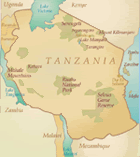A Tour of My World
Meanwhile, I was playing around with Google Earth (one of the coolest things on the web in the opinion of this former geographer) and I realized that I've never really told you much about where I live.

This is a map of Africa. You can find Tanzania in East Africa - the bigish country on the right center (there is a very small yellow pin in the middle of it). Tanzania borders Kenya, Uganda, Rwanda, Burundi, Congo, Zambia, Malawi and Mozambique - making the border police very busy, I'm sure - but also meaning that Tanzania's ports are a very important strategic asset - both for business and other more nefarious ventures.

This map highlights the various regions of Tanzania - and you can see a little bit better where Dar es Salaam is located - right on the Indian Ocean coast in a hot and humid (and when it is not raining - dusty) spot.

Here you can see Dar up close and personal. I live on the Msasani Pennisula - which is in the northern part of Dar es Salaam. Some people call "the pennisula" an expat ghetto. It is true that the majority of expats live here... where there are cooler breezes, more Western-style amenities and less malaria than other parts of town. Many people feel embarrassed about living in this sort of ghetto, but not me. I didn't come to Africa to "slum it". I'm here for the lifestyle. (And to "contribute" in the human-to-human sense.)

Here I've tried to mark some of the more important places I visit regularly on "the pennisula". You can see the Sea Cliff Hotel where the kids and I spend every Sunday at the pool, and right next door the Sea Cliff Village, where I go when I'm in the mood for a Subway sandwich (just like Jarred). I've also marked the George and Dragon, the English Pub where I've spent way too much time the last few months (but haven't confessed it to you until now). You can see the Oyster Bay Shopping Center where I shop in the Italian deli and buy my fruits and vegetables fresh off the farm. You can also see where my house is - as well as the Slipway shopping center where you can find me having a pedicure on many Saturdays.

Here you can actually see the roof of the house where Jaden, Rowan and I live. Notice that I'm just one block from the beach. (That strech of beach is the Yacht Club where South Africans try to relive their glory days of apartide - but also where you can get the best pizza in Dar.) This photos was clearly taken before my landlord built my roof deck. You can see that most of the roads are unpaved - and in fact now that it is the rainy season - a current photo would show giant potmarks!

This photos shows you my office - where I slave away every day to ensure that Tanzanians, and Randall Tobias, can have multiple sex partners "safely".
This photo also gives you perspective on my commute. It only takes about 20 minutes to get from my house to my office (on the lower left). About half-way between the two, right on the beach, I drop Jaden and Rowan at school every morning.

And lastly I just wanted to show you where Zanzibar is in relation to Dar es Salaam. As you can see... it is pretty close - a short 2 hour ferry or 20 minute airplane hop away. If you come and visit us like Jane, Marija, Ilco, Rob, Kent, Damon, Laura, Amy, Jamy, David and Lisa will be doing in May and June, I would send you here for a wonderful and exotic beach vacation.
Will we be seeing you soon?











 Jaden and Rowan
Jaden and Rowan






